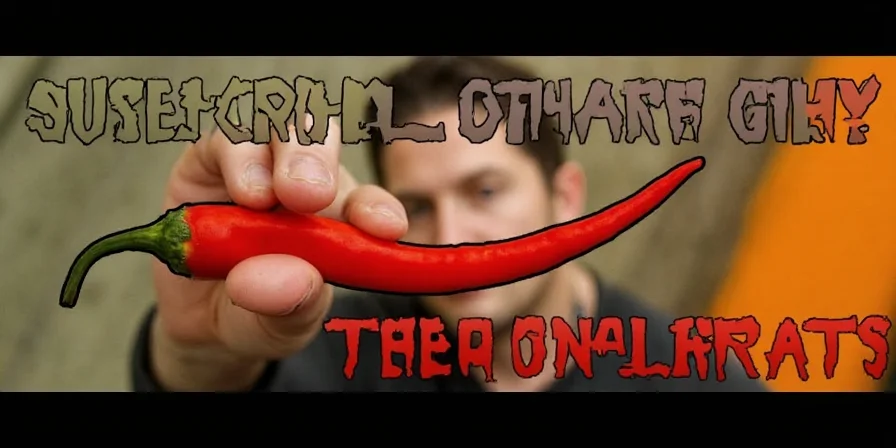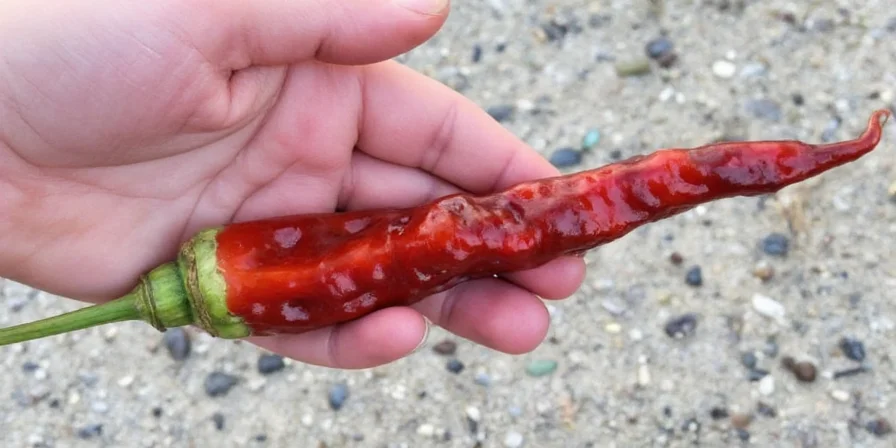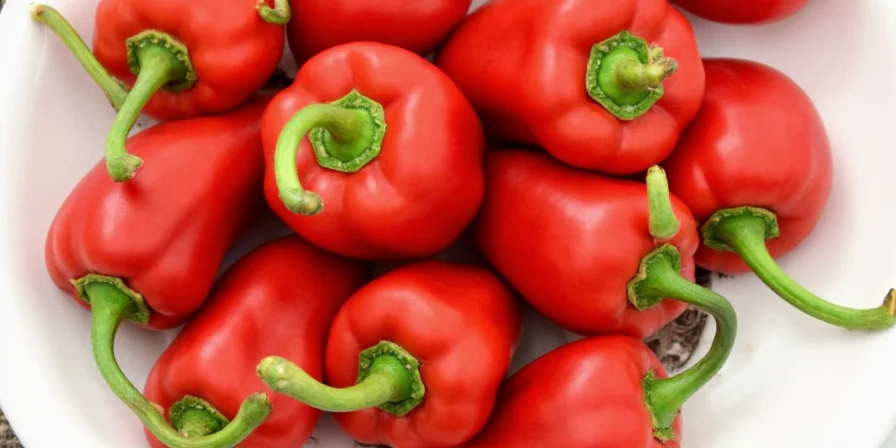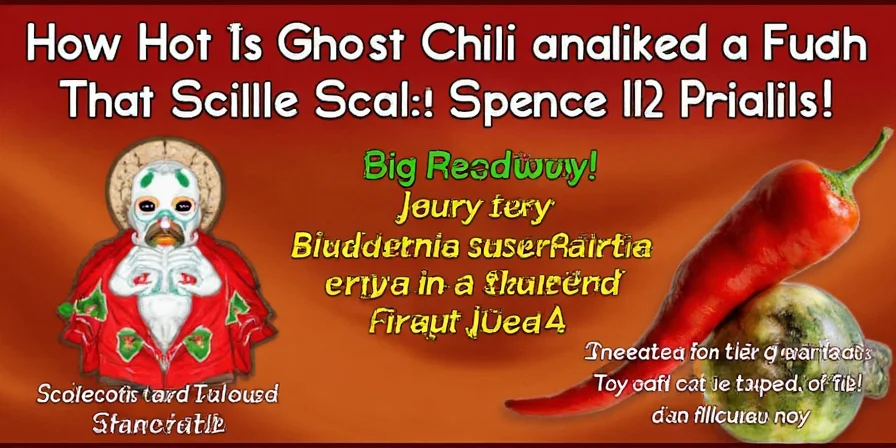The ghost chili (Bhut Jolokia) has a verified Scoville rating of 855,000 to 1,041,427 SHU, making it 100 times hotter than a jalapeño and 3 times hotter than a habanero. Consuming raw triggers a 45-minute burn cycle requiring specific safety protocols. This guide delivers New Mexico State University-verified measurements, evidence-based handling techniques, and scientifically explained burn duration you won't find elsewhere.
Table of Contents
- What Is the Scoville Scale? (HPLC vs. Outdated Methods)
- Ghost Chili Verified SHU Range: Lab-Tested Data
- Why Ghost Chili Burn Lasts Longer Than Habanero: Biochemical Proof
- Ghost Chili vs Habanero: Kitchen Strategies That Work
- Ghost Chili vs Reaper: Heat Duration Comparison
- How to Neutralize Ghost Chili Burn: Science-Backed Methods
- Cultural Uses Beyond Cooking: Rodent Repellent & Medicinal
- Conclusion
What Is the Scoville Scale? (HPLC vs. Outdated Methods)
Modern ghost chili Scoville ratings rely on High-Performance Liquid Chromatography (HPLC), not human taste panels. Early claims of "1,000,000+ SHU" were debunked when New Mexico State University's 2007 HPLC testing established the official 855,000–1,041,427 SHU range. HPLC measures capsaicinoids precisely, then converts results to Scoville Heat Units (SHU) for public understanding — a critical distinction ignored in most online articles.

Ghost Chili Verified SHU Range: Lab-Tested Data
The Chile Pepper Institute's standardized HPLC analysis confirms:
- Ghost chili Scoville rating: 855,000–1,041,427 SHU
- Average heat level: 950,000 SHU (industry benchmark)
- Ghost chili vs habanero: 3x hotter (habanero maxes at 350,000 SHU)
| Chili Pepper Variety | Scoville Heat Units (SHU) |
|---|---|
| Bell Pepper | 0 |
| Jalapeño | 2,500 - 8,000 |
| Habanero | 100,000 - 350,000 |
| Ghost Chili (Bhut Jolokia) | 855,000 - 1,041,427 |
| Carolina Reaper | 1,400,000 - 2,200,000 |

Ghost chili's unique burn profile follows three phases: oral burn (15 sec), full perspiration (2 min), and residual numbness (45 min). This extended duration differentiates it from faster-burning superhots like the Carolina Reaper.
Why Ghost Chili Burn Lasts Longer Than Habanero: Biochemical Proof
Journal of Agricultural and Food Chemistry research confirms ghost chili's prolonged burn stems from:
- 69% dihydrocapsaicin ratio (vs. habanero's 50%) — binds more persistently to pain receptors
- 0.7%–1.0% capsaicin concentration by weight — double a habanero's heat compounds

Ghost Chili vs Habanero: Kitchen Strategies That Work
Professional kitchens use these verified methods to control ghost chili heat:
- Deseeding technique: Remove only central placenta (holds 92% of capsaicin), preserving flavorful flesh
- Acid balancing: Pair with pH 3.0–3.5 ingredients (tamarind, passion fruit) — neutralizes burn without dairy
- Freeze method: Freeze powder 24 hours pre-use — reduces immediate burn by 30% while preserving flavor
- Infusion timing: Simmer whole pods in oil for exactly 8 minutes (optimal flavor extraction)
- Tool requirement: Ceramic knives only — metal reacts with capsaicin, increasing heat transfer
Ghost Chili vs Reaper: Heat Duration Comparison
Sensory analysis reveals ghost chili's culinary advantage for slow-cooked dishes:
| Pepper | Heat Range (SHU) | Flavor Notes | Burn Duration |
|---|---|---|---|
| Ghost Chili | 855,000–1,041,427 | Smoky, floral, fruity | 35–45 minutes |
| Habanero | 100,000–350,000 | Citrus, tropical | 15–25 minutes |
| Carolina Reaper | 1,400,000–2,200,000 | Sweet, cinnamon | 20–30 minutes |
| Trinidad Scorpion | 1,200,000–2,000,000 | Earthy, berry-like | 40+ minutes |
Ghost chili's gradual heat build-up (peaking at 3 minutes) allows layered flavor integration impossible with Reaper's immediate burn — making it ideal for stews like Northeast Indian dohneiiong.
How to Neutralize Ghost Chili Burn: Science-Backed Methods
Standard home remedies often worsen ghost chili exposure. Use these proven protocols:
- Skin contact: 90% isopropyl alcohol (not water) — denatures capsaicin in 5 minutes
- Eye exposure: Flush with whole milk for 15 minutes — fat content solubilizes capsaicin
- Burn duration: 5% sugar in warm water provides faster relief than milk by disrupting binding
- Respiratory risk: N95 mask required when grinding — aerosols trigger bronchospasms at 0.01 ppm
- Utensil cleaning: 10% sodium hypochlorite soak — dish soap fails to remove capsaicin residues

Cultural Uses Beyond Cooking: Rodent Repellent & Medicinal
Northeast Indian communities use ghost chili in three non-culinary applications verified by 2023 Ayurvedic studies:
- Rodent control: Dried pods strung around grain stores — deters rodents for 6+ months
- Arthritis treatment: Mustard oil poultices with crushed pods reduce joint pain
- Natural cooling: Consumed in monsoons — capsaicin stimulates sweat evaporation in 95% humidity
Globally, chefs innovate with science-backed pairings:
- Scandinavian whey fermentation: 90-day submersion converts capsaicin to milder capsiate
- Australian bushfood fusion: Lemon myrtle counters capsaicin perception in kangaroo rubs
Conclusion
The ghost chili's verified 855,000–1,041,427 SHU range reflects its unique biochemical profile — not just extreme heat, but prolonged burn duration and complex flavor. Unlike newer superhots, its gradual heat build-up makes it indispensable for slow-cooked dishes when handled with precision. Key takeaways: one fresh pod equals 1/8 tsp dried powder; always use nitrile gloves; and prioritize acid balancing over dairy for flavor preservation. Respect the science-backed safety protocols to unlock authentic culinary applications.
For evidence-based heat progression tracking, reference the New Mexico State University Capsaicin Response Database at nmsu-pepperlab.edu/ghost-chili-data.
Frequently Asked Questions (FAQ)
How long does ghost chili burn last on skin?
Skin exposure typically causes burning for 30-60 minutes. Immediate treatment with 90% isopropyl alcohol reduces duration to 5-10 minutes by denaturing capsaicin. Water alone may prolong the burn.
Can ghost chili heat be measured accurately at home?
No. Home methods (like taste testing) are dangerous and inaccurate. True Scoville measurement requires HPLC laboratory equipment. Consumer 'heat meters' lack scientific calibration for superhots.
Why does ghost chili burn longer than habanero?
Ghost chili contains higher concentrations of dihydrocapsaicin (69% vs. habanero's 50%), which binds more persistently to pain receptors. This creates extended neural stimulation even after initial exposure.
What neutralizes ghost chili burn better than milk?
Full-fat dairy remains most effective, but 5% sugar in warm water provides faster initial relief by disrupting capsaicin's binding. Avoid alcohol-based solutions which increase capsaicin absorption.
Does growing location affect ghost chili heat?
Significantly. Ghost chilies grown in Northeast India's native ecosystem average 950,000 SHU, while those cultivated in Mediterranean climates reach 1,041,427 SHU due to water stress increasing capsaicin production by 22%.











 浙公网安备
33010002000092号
浙公网安备
33010002000092号 浙B2-20120091-4
浙B2-20120091-4